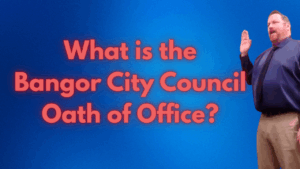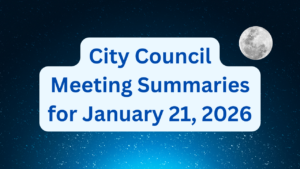
On February 27, Bangor City Council was notified that Casella, the company Bangor uses to handle biosolid waste from the wastewater treatment facility, had notified the city that they were no longer able to take their biosolids to the landfill. It was labeled a crisis, and it was put out there that we’re two weeks or less away from disaster if this waste doesn’t get picked up. Or as the Director of Water Quality Management put it: “a human health and environmental crisis.“
I wrote a blog post about it on March 3rd. That’s when I finally heard about it through a friend who watched that meeting on the 27th. You’d think the city might have made some kind of official announcement about it, urging residents not to panic, or ask the Bangor delegation to the Legislature to join them in a joint statement on the situation. Something. Anything to keep residents properly informed. No such luck.
The Maine State Legislature summoned Casella to explain the crisis in detail. No sooner did the notice go out, suddenly an alternative had been found. Casella would export waste to New Brunswick, giving all municipalities breathing room.
The Environment and Natural Resources Committee held the meeting on March 8, 2023. During that hearing Casella was reminded that their public testimony for LD 1911 and LD 1639 demonstrated that the company knew what the repercussions would be if they did not adjust their business model in response to these laws. Shelby Wright of Casella offered testimony stating this as far back as May 17, 2021.
The next day, on March 9th, the city of Bangor finally spoke up on Instagram and Facebook. That was to be the first act of a political game the city of Bangor decided to play on behalf of Casella.
Act I: Throwing the Maine State Legislature under the bus with Casella talking points
In spite of everything revealed at that March 8th meeting, the Bangor City Council chose to sign an open letter the city’s staff wrote to the Maine State Legislature using Casella’s talking points. Here’s the picture they wanted to paint: the Legislature passed these two laws, LD 1911 and LD 1639 which messed everything up, and now the state needs to come up with a solution. This open letter, shown at the end of this blog post, was written to give the impression that the Legislature passed these laws without any consideration of effect they’d have, and then left municipalities to fend for themselves.
The story unravels when you look at a calendar.
When you look up those two bills the city blamed for causing all of this disruption, you’re treated to public testimony going back to May 17, 2021. And more of it in January 2022. February 2022. What is happening now was predicted almost 2 years ago.
Casella and the city of Bangor would like us all to believe that this is a case of “I told you so.” If the law was passed 24 hours before it went into effect, then I’d be right there with them. But it wasn’t. The law was signed in April of 2022. The writing was on the wall that these were going to pass. That’s why there was that panic set of additional testimony that went out in February of 2022. Any corporation that was serious about working in the confines of the law would have been working to make key changes way back then. Not Casella, though. They’ll telling us they’re “scrambling” NOW to find needed materials. Well, Casella, just like I tell my kids when they’re running late for school, “if you had started getting ready when I first told you to, you wouldn’t be late.”
One last thing. You know what was NOT mentioned in the city’s letter? PFAS. The entire purpose of passing those laws. PFAS is destroying farms and poisoning us so the Maine Legislature stepped up to protect us. That doesn’t play well for Casella’s narrative that those laws were reckless, so of course Bangor fails to mention PFAS. Remember this, as it’ll be coming up again in Act IV.
Act II: Bangor’s Delegation responds with an op-ed in the Bangor Daily News
In response to Casella’s open letter written on City of Bangor letterhead and signed by City Council, the Bangor delegation to the State Legislature responded with an op-ed in the Bangor Daily News entitled, “We’ll hold Casella accountable to protect your health and environment.“
The op-ed told the whole story and used data to back it up. It confirmed what many in Bangor already knew to be true: Casella had time and solutions available, they chose to manufacture a crisis for profit. From the op-ed:
Another disturbing moment from that briefing was when Casella admitted that it was well within its rights to cancel municipal contracts but had magnanimously decided not to. Casella has a virtual monopoly on waste management in this state, and the company made it clear in last week’s briefing that it wasn’t afraid to use that monopoly to intimidate their customers into accepting their terms. Interestingly, when Casella officials were called before the Legislature to explain the “crisis,” they somehow found a solution to the issue quickly. Apparently, this has not been communicated to Bangor city officials.
Sideshow: Angry constituent pounding the podium
The day the op-ed hit, I went to the City Council meeting to express my displeasure about the city solely blaming the state for the current situation yet didn’t take steps to prepare for any of it on our end. While other municipalities were reaching out already to the state of Maine, and putting in for Congressionally Directed Spending for long-term biosolids storage or PFAS treatment projects last year, Bangor was nowhere to be found on that front. The city was well aware of the potential disruption through city employee testimony last year and was not some helpless bystander in all of this. We need our city to be on top of this stuff.
Act III: Meeting at City Hall with two agendas
The op-ed landed, and the city of Bangor responded by inviting our Legislative delegation for a meeting the following Monday. Every Friday the city publishes the next week’s meeting agendas. The agenda for this meeting was… strange. It included slides from a presentation that was going to be giving that looked like something fitting for a 3rd grade science class. The Legislators who would be appearing at the meeting have a strong grasp on the situation and have been studying this issue since at least 2021. This presentation came off as insulting. I created a video reviewing the presentation ahead of that meeting:
It was clear that presentation was not designed to educate the Legislators. It was designed to embarrass them. The city of Bangor wanted everyone watching this meeting to have the impression that our Legislators do not understand the issue, and that this elementary school presentation that looks like pages ripped out of a Little Golden Book was necessary to bring them “up to speed.”
There were two agendas for that meeting. The published agenda, where this meeting was supposed to be about communication and working together, and then the hidden agenda.
The city’s true goal was to push public opinion towards Casella’s favor by creating an illusion that our legislators are out of touch with the issue the city is facing and that they created a mess without a plan B. The city kept hammering this point home by repeatedly stating they simply wanted to know what to do if Casella opts to no longer accept Bangor’s biosolids.
The City of Bangor has a communication problem.
Representative Amy Roeder shared pointed feedback with the City Manager of Bangor that the city has a communication issue. State legislators are always a phone call or email away, and the city dropped that ball hard.
Our city motto has gone from “Queen City” to “Pass the Buck”.
All of that feedback, including the assertion that the situation could have been cleared up months ago had the city picked up the phone or emailed back then. To which the City Manager replies, “Well, I was on vacation when the notice came in.” Must have been a great feeling for all the city officials sitting there to watch the City Manager throw them under the bus.
City Hall: Inform our citizens? Who? US?
This goal became crystal clear during Monday’s meeting when, after all of the air was cleared and misinformation was put to bed, Representative Rana asked if the city officials would be informing residents about everything that was learned during the meeting. Councilor Tremble cut her off to point out that a Bangor Daily News reporter was in attendance, to which the City Manager added that all the media was there.
Interesting response coming from the same city officials who rushed to try and control the narrative when they didn’t like the media’s coverage of Bangor’s dismal handling of the city’s housing and homelessness crisis. Whenever the city thinks the news helps it, they’re quick to get social media posts out about it. But this time? Let the newspapers handle it, they say. (Nudge, nudge, wink, wink.)
And sure enough, the other shoe dropped hours after the meeting when the Bangor Daily News put out an article in record time with the headline, “Lawmakers offer no immediate solutions to Bangor’s sludge crisis.” Articles about other meetings at City Hall usually don’t get published that fast. The fix was in. No wonder the city was more than happy to let the BDN take the reins on this one.
Getting the story out there: Naming the game in a 6 minute video
Act IV: Casella pretends to be the sensible one
So what was the point of the city of Bangor doing all of this? To soften up the playing field for this morning’s op-ed. Enter John W. Casella’s opinion piece that should have been titled, “For-profit waste management company thinks Maine laws should be changed to benefit that particular for-profit waste management company.” Guess what the letter doesn’t mention? You guessed it. PFAS. Just like the open letter from the city of Bangor in Act I.
Casella would love nothing more than to get back to business as usual. It yearns for the profit it was reaping from importing out-of-state waste and using a loophole to get it into our state-owned landfill. It was a double whammy when Maine pulled the plug on the lucrative practice of spreading PFAS-laden biosolid waste on farmland.
What’s a billion-dollar company to do when a couple of state laws are standing between them and their cash cow? Big Tobacco all over again, of course. Downplay the science and get politicians to do your bidding. Only problem is, they couldn’t find enough in Augusta. No leverage to buy support with them. But municipal leaders? All it took was one little scare tactic. Bangor’s city officials took the bait.
The people of Bangor won’t be fooled.
Casella miscalculated. Any credibility our city leadership had with its citizens went out the window long ago. It was already on thin ice from years of our biggest issues not being properly addressed. Watching the city bungle handling $20.48 million in ARPA funds with an ever-evolving “not our fault” story torched the rest. Too many problems that promised to get worked on only to be left to flounder and worsen while being met with a growing, steaming pile of excuses. The City reaped what it sewed when it attempted to call out the State Legislature on social media. Bangoreans are too used to the City’s smoke-and-mirrors game. We aren’t buying it.
So, what happens next?
The State Legislature will be staying on Casella and its monopoly over our waste disposal and holding them accountable. That’s the short-term solution. They’re gathering long-term solutions to look at and study and will be presenting them to stakeholders across the state in a few months. Our legislature is committed to finding the right answer: a solution that takes care of our waste disposal needs while protecting our health and our environment.
City Council will sign on to another open letter looking for funding to cover the increased costs of our short-term solutions. That’s a start. The city states it stands ready to provide all available staff and resources to the State Legislature towards selecting and implementing a long-term solution. I would also hope that the city learned its lesson about playing political chicken with the state on behalf of for-profit companies when our health and the environment is on the line.
One last thing: Now we know we’ve always been 2 weeks from disaster. For years.
The average citizen doesn’t think about their wastewater treatment facility. I certainly wasn’t. I took it for granted and was grateful our city was handling it with no fanfare. The cat’s out of the bag and there’s no going back now: Bangor did not have a plan B for biosolids disposal and we’ve been lucky we never needed one before now.
When you look back at all of the communication from the city on this biosolids crisis and the explanation to the public of what’s happening, we did not hear any mention of an existing contingency plan. Had Casella’s pickup been disrupted for any other reason, at any other time, what would the city have done? Even in spite of being briefed on possible changes as a result of these laws a year ago, Bangor still had no backup plan.
That means that at any given time we’ve always been two weeks from disaster. The people of Bangor simply didn’t know it. In addition to thanking the Maine State Legislature for working to prevent the further spread of PFAS contamination and our exposure to it, we can also thank them for eventually giving Bangor something it never had all these years: a plan B for biosolid disposal.







